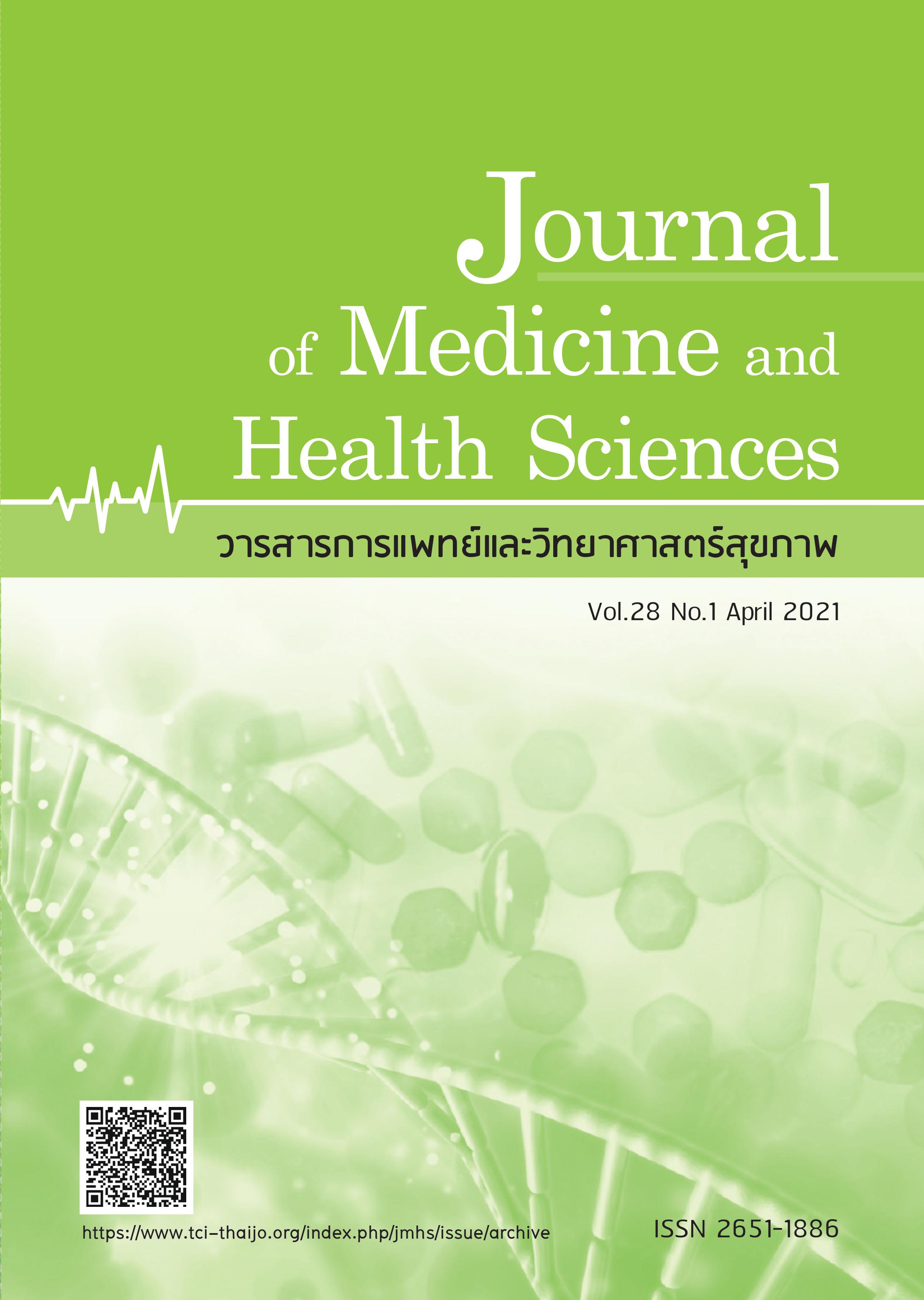Effectiveness of educational and enhancing problem-solving competent program on medication use behavior in Type 2 diabetes mellitus patients
Keywords:
Type 2 diabetes mellitus, medication use behavior, health education, problem-solving competencyAbstract
This research aims to examine the effectiveness of educational and enhanced problem-solving competent program on medication use behavior among Type 2 diabetes mellitus patients. This research is a quasi-experimental study with two groups with a pre-posttest design. The sample comprised of 60 Type 2 diabetes mellitus patients who received services at a chronic illness clinic of the Banladchang Health Promoting Hospital in Nakorn Nayok province. Simple randomization was used to allocate 30 patients in the experimental group and 30 patients in the control group. The control group received routine health care services, while the experimental group also received routine health care services and was assigned to join the educational and enhancing problem-solving competent program of inappropriate medication use behavior for a period of eight weeks. The program consists of learning basic knowledge and the complications of diabetes mellitus, the actions and side effects of remedy medicine, practicing problem-solving skills on medication use behaviors (either the oral or the injection method) including reading medication labels, medication preparation, asking for medication use counseling, exchanging information and experience regarding medication use, discussing assigned situations of medicine usage, and a receiving handbook of the educational and enhancing problem-solving on medication use behaviors. Every day they received an encouraging message through the LINE application. A t-test was employed for the data analysis. The results found the following: (1) the experimental group had inappropriate medication use behavior scores after receiving the educational and enhancing problem-solving competent program lower than before the program and with a statistical significance. (p<0.001); (2) the experimental group had inappropriate medication use behavior score lower than the control group and with a statistical significance. (p=0.020) In conclusion, this study indicated that Type 2 diabetes mellitus patients had inappropriate medication use behaviors or medical use problems. Therefore, nurses or health care providers could apply this program for promoting Type 2 diabetes mellitus to get better and develop more appropriate medication use behaviors.
References
2. Ministry of Public Health. Health data center: prevalence of non communicable disease report: diabetes mellitus 2019 (cited 2019 Jan 14). Available from https:// hdcservice.moph.go.th/hdc/reports/ report.php.
3. Diabetes association of Thailand. Clinical practice guideline for diabetes 2017. 3rd ed. Bangkok: Romyen media; 2017.
4. Sittidach Y. The management of drug related problems at male-medical ward by ward pharmacist. Thai JOPH 2007;17: 109-19.
5. Durongrittichai V, Buajaroen H, Kompayak J, et al. The development process for empowering health of diabetes mellitus patients under theory of goal attainment. JPHN 2008;22:1-16.
6. B o o n c h o o n g N , K u a n j a r i t V , Jaturapattrawong A. Evaluation of drug prescribing at primary care unit drug related problem and patient’s satisfaction.
TJHP 2007;17:210-22.
7. Hauber AB, Mohamed AF, Johnson FR, et al. Treatment preferences and medication adherence of people with Type 2 diabetes using oral glucose-lowering agents. Diabetes Med 2009;26:416-24.
8. Hill-Briggs F. Problem solving in diabetes self-management: a model of chronic illness self-management behavior. Ann Behav Med 2003;25:182-90.
9. Bandura A. Self-efficacy: Toward a unifying theory of behavioral change. Psychol Rev 1977;84:191-215.
10. Rattanapongsai P, Lagampan S, Pichayapinyo P. Impact of medication literacy programme on uncontrolled type
2 diabetes patients’ health literacy on medication and medication adherence. TJNC 2016;31:50-62.
11. I n g k a m a n e e N , K u s u m a N A , Puwarawuttipanit W, et al. Effectiveness of promting a problem – solving ability program on medication adherence in patients with type 2 diabetic. Nurs Sci J Thail 2011;29:56-64.
12. Meebunmak Y, Srisaket J, Phokwang W, et al. A Systematic Review on Health Care Programmes for Older Adults with Diabetes Mellitus. NJPH 2017;27(Suppl December):72-89.
13. Ministry of Public Health. Health data center: Proportion of outpatients with dabetes mellitus received services in the health promoting hospitals compared with the mae khai hospital, health district 4, Nakhon Nayok province 2018. (cited 2021 April 15). Available from https://nyk. hdc.moph.go.th/hdc/reports/report.php



